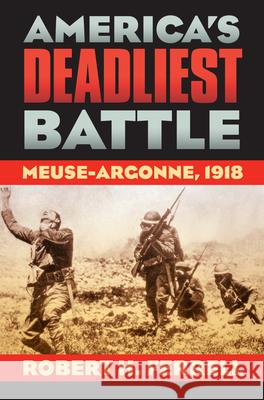America's Deadliest Battle » książka
topmenu
America's Deadliest Battle
ISBN-13: 9780700618576 / Angielski / Miękka / 2007 / 208 str.
American fighting men had never seen the likes of it before
The great battle of the Meuse-Argonne was the costliest conflict in American history, with 26,000 men killed and tens of thousands wounded. Involving 1.2 million American troops over 47 days, it ended on November 11--what we now know as Armistice Day--and brought an end to World War I, but at a great price. Distinguished historian Robert Ferrell now looks back at this monumental struggle to create the definitive study of the battle-and to determine just what made it so deadly. Ferrell reexamines factors in the war that many historians have chosen to disregard. He points first to the failure of the Wilson administration to mobilize the country for war. American industry had not been prepared to produce the weaponry or transport ships needed by our military, and the War Department-with outmoded concepts of battle shaped by the Spanish-American War-shared equal blame in failing to train American soldiers for a radically new type of warfare Once in France, undertrained American doughboys were forced to learn how to conduct mobile warfare through bloody experience. Ferrell assesses the soldiers' lack of skill in the use of artillery, the absence of tactics for taking on enemy machine gun nests, and the reluctance of American officers to use poison gas-even though by 1918 it had become a staple of warfare. In all of these areas, the German army held the upper hand. Ferrell relates how, during the last days of the Meuse-Argonne, the American divisions had finally learned up-to-date tactics, and their final attack on November 1 is now seen as a triumph of military art. Yet even as the armistice was being negotiated, some American officers--many of whom had never before commanded men in battle--continued to spur their troops on, wasting more lives in an attempt to take new ground mere hours before the settlement. Besides the U.S. shortcomings in mobilization and tactics, Ferrell points to the greatest failure of all: the failure to learn from the experience, as after the armistice the U.S. Army retreated to its prewar mindset. Enhanced by more than four dozen maps and photographs, America's Deadliest Battle is a riveting revisit to the forests of France that reminds us of the costs of World War I--and of the shadow that it cast on the twentieth century.










